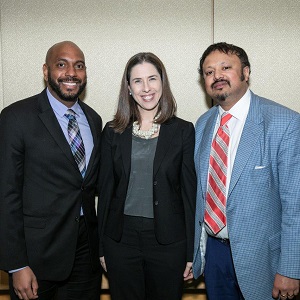Transwestern, Delta Associates and Sage Policy Group Host 22nd Annual TrendLines®
February 11, 2019
 WASHINGTON – The commercial real estate market in the Washington metro fared well during 2018, recording above-average job growth, robust absorption, lowered vacancy rates, and persistently low capitalization rates. The performance was boosted by optimism in the fourth quarter from Amazon’s announcement that Northern Virginia is one of its two new HQ2 sites. This was one of five MegaTrends highlighted at Transwestern Commercial Services’ 22nd annual Washington, D.C., TrendLines® event, which provides the region’s leading economic and commercial real estate analysis.
WASHINGTON – The commercial real estate market in the Washington metro fared well during 2018, recording above-average job growth, robust absorption, lowered vacancy rates, and persistently low capitalization rates. The performance was boosted by optimism in the fourth quarter from Amazon’s announcement that Northern Virginia is one of its two new HQ2 sites. This was one of five MegaTrends highlighted at Transwestern Commercial Services’ 22nd annual Washington, D.C., TrendLines® event, which provides the region’s leading economic and commercial real estate analysis.
The event, held Feb. 7 at Ronald Reagan International Trade Center, was produced as a collaboration between Transwestern Commercial Services (TCS), its research affiliate Delta Associates, and Sage Policy Group, with support from sponsors PNC Real Estate, Baker Tilly and DFS Construction. Speakers included Sage Policy Group CEO Anirban Basu, TCS Director of Research – Mid-Atlantic Elizabeth Norton, and Delta Associates President William Rich. The event also honored Matthew Kelly of JBG SMITH as TrendSetter of the Year for his contributions to the Washington commercial real estate industry.
“The Washington, D.C., area has emerged as a superstar city,” said Basu. “Amazon’s decision to locate HQ2 in Northern Virginia is in line with the trend of other renowned companies increasing operations in and around the city and attracting outstanding employees with housing needs. This growth increases opportunities for existing companies as well as attracting global investors.”
Other MegaTrends highlighted at the event include:
MID-CYCLE OR LATE CYCLE? TOUGH TO TELL: By mid-summer 2019, the current economic expansion will become the lengthiest in American history. Many economists expect the next recession to begin next year, yet few have identified a triggering mechanism that will usher forth the next downturn.
THE SUBURBAN WASHINGTON OFFICE MARKET RETURNS: Office demand has started to shift to the Washington suburbs, after the District accounted for 76 percent of the metro-wide net absorption during the current recovery period. The TrendLines report anticipates this trend to continue in 2019 and beyond, with the location of Amazon’s HQ2 in Crystal City and the residual effects it will have on the economy as the metro continues to position itself as a tech hub.
STRONG INDUSTRIAL DEMAND PUSHES BOUNDARIES: The report forecasts continued growth in the industrial market in 2019 and beyond. The rent spikes that occurred during 2018 will likely continue this year. This, coupled with limited available new space and tight labor market fundamentals, will likely push some tenants to the outer markets of Cecil County and along the Interstate 81 Corridor in Northern Virginia and Suburban Maryland.
“One of the region’s challenges will be to meet the growth needs in the industrial market as the commercial real estate market will continue its shift to favor multifamily,” said Norton. “By 2020, we expect multifamily will represent 35 percent of the total commercial real estate market in the Washington/Baltimore region, compared to industrial at 20 percent. Industrial worker shortages will continue as baby boomers retire and younger workers choose other fields.”
AMAZON HQ2’S IMPACT ON THE HOUSING MARKET: The impact of Amazon HQ2 on the Washington metro housing market will reach beyond the confines of National Landing as employees will likely seek housing in markets across the Washington area. The report estimates more than two-thirds of the HQ2 workforce will buy or rent single-family homes or townhomes/row homes, leaving approximately 6,600 employees who will opt for an apartment or condominium in the Washington metro by 2030; this will increase to 9,900 at full build-out by 2034.
“If Arlington, Virginia, mirrors the annual home price growth experienced by Amazon’s hometown of Seattle, which is among the fastest growing cities in the country, the Washington metro may quickly regain ground as one of the nation’s strongest housing markets,” said Rich.
ABOUT TRANSWESTERN COMMERCIAL SERVICES
Transwestern Commercial Services (TCS) is a privately held real estate firm of collaborative entrepreneurs who deliver a higher level of personalized service and innovative client solutions. Applying a consultative approach to Agency Leasing, Asset Services, Occupier Solutions, Capital Markets and Research, our fully integrated global organization adds value for investors, owners and occupiers of all commercial property types. We leverage market insight and operational expertise from across the Transwestern enterprise, which includes firms specializing in development and real estate investment management. TCS has 34 U.S. offices and assists clients from more than 200 offices in 37 countries through strategic alliances with France-based BNP Paribas Real Estate and Canada-based Devencore. Experience Extraordinary at transwestern.com and @Transwestern.
ABOUT DELTA ASSOCIATES
Delta Associates offers consulting and research services and subscription reports to the commercial real estate industry. For the past 35 years, investors, owners and occupiers of real estate have relied on our insight for market studies, market entry strategies, asset performance enhancement, pre-acquisition due diligence, impact analyses and litigation support. Our practice is experienced in most commercial property types, including apartments, condominiums, office, retail, hotel and mixed-use projects. For more information, visit deltaassociates.com.
Photo caption: (L to R) Delta Associates President William Rich; TCS Director of Research – Mid-Atlantic Elizabeth Norton; and Sage Policy Group CEO Anirban Basu. The three experts highlighted MegaTrends impacting the Washington, D.C., commercial real estate market at the 22nd Annual Washington, D.C., TrendLines® event held Feb. 7, 2019.
Media Contact:
Sabina Gill
301.896.9059
sabina.gill@transwestern.com
twmediarelations@transwestern.com

